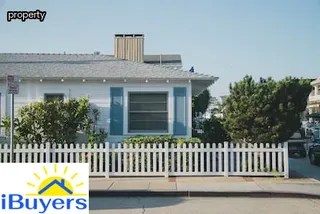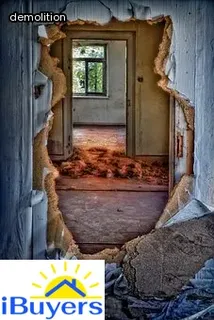When it comes to demolishing a house with an existing mortgage, there are a few important factors to consider. Firstly, in most cases the homeowner is responsible for paying off the remaining balance of their mortgage before they can begin the demolition process.
Additionally, if you have an outstanding loan or lien against your property, you must contact your lender to make sure all payments are up-to-date before proceeding. It is also important to be aware that if there is any equity in the home, it will need to be taken into consideration upon demolition.
Furthermore, some lenders may require additional paperwork or forms to be completed prior to allowing a homeowner to demolish their home. Finally, homeowners should understand that they may still need to pay taxes on the demolished property even after the loan has been paid off.
With all of these considerations in mind, it's important for homeowners to do their research and ensure they are aware of all requirements before beginning the demolition process on a house with an existing mortgage.

Demolishing a home with an outstanding mortgage can have significant financial implications, and it’s important to be aware of the impact before making the decision. When considering knocking down and rebuilding, the homeowner must take into account that lenders may require additional security for the loan or a higher down payment if they are uncomfortable with the risk of demolition.
The mortgage amount may also increase since lenders will need to factor in costs associated with rebuilding. Depending on how much equity is present in the property, a homeowner may even need to get a new loan altogether instead of refinancing their existing one.
Homeowners should also be aware that they could face penalties imposed by their lender if they violate any terms related to demolishing their property. Before going ahead with demolition, it’s important to consider all aspects of your financial situation and speak with your lender about possible risks and requirements.
Demolishing a home with an outstanding mortgage is a complex process that requires careful consideration. It is important to understand the legal obligations and financial considerations associated with demolishing a house with a mortgage.
Before beginning the process, it is essential to contact the lender who holds the mortgage and determine whether they will allow demolition of the house, as well as any other requirements they may have. Additionally, local laws and ordinances may require permits or inspections before demolition can commence.
Depending on the size of the property and scope of work, there may also be environmental concerns that need to be addressed. After all steps are taken care of, it is time to hire a professional contractor to safely demolish the structure while adhering to all applicable laws and regulations.
The contractor will typically haul away debris and dispose of it according to local safety rules and regulations. Once complete, any remaining property taxes must be paid off and any liens released before ownership can be transferred from the lender to another party.

Demolishing a home with an outstanding mortgage can have serious consequences for your finances. When you demolish a property, you’re no longer responsible for the mortgage payments and you may be liable for additional costs like demolition fees and hazardous material removal.
In addition, if the property is held as collateral on another loan such as a car loan, the lender may demand full repayment immediately. If you can’t repay the loan right away, it could severely damage your credit score.
Even if the home isn’t collateral on a loan, it still affects your credit report since any liens placed against the property will stay on record even after it’s been demolished. You should speak to an attorney or financial adviser before taking any action to ensure that you understand all of the potential legal and financial implications.
Demolishing a home with an outstanding mortgage can be a complicated process. Before starting, it is important to consider the impact of the demolition on the mortgage, as well as the demolition costs.
You should also check if there are any local laws that prohibit demolishing a mortgaged home and if you need approval from the lender. Furthermore, it's essential to research the cost of labor and materials needed for demolition, as well as any permits or inspections you may need.
Additionally, you should consider what will happen to the debris afterward and if it needs to be disposed of properly according to local regulations. Understanding all of these factors before moving forward will help ensure that your demolition project goes smoothly.

When demolishing a home with an outstanding mortgage, it is essential to understand the restrictions that lenders may impose. From requiring written permission from the bank to forbidding any demolition work at all, lenders have their own policies on how they handle mortgages when a homeowner wants to demolish their house.
Knowing these restrictions can help ensure that the process goes as smoothly as possible. For example, although some lenders may allow demolition of a property with an active mortgage, others may require the loan balance to be paid off in full before this work can begin.
Additionally, homeowners should be aware of any environmental or zoning regulations that must be met prior to demolition and make sure any permits required are obtained from local authorities. Furthermore, there are certain steps that must be taken to alert utilities such as water and electric companies of the pending demolition work.
Lastly, it is important for homeowners to check with their lender prior to beginning any part of the demolition process in order to avoid incurring additional costs or penalties down the line. By taking these simple steps and following lender restrictions closely when demolishing a home with an outstanding mortgage, homeowners can rest assured that they are doing everything in their power to ensure a smooth process without unexpected surprises.
Demolishing a home with an outstanding mortgage can be both beneficial and risky. On the one hand, if the homeowner has enough equity in the property, they may be able to recoup some of their costs through the sale of scrap materials or by re-selling salvaged items from the demolition.
On the other, any remaining balance on the mortgage will still need to be repaid before ownership is transferred, leaving any profits from the demolition subject to paying off that debt. In addition, homeowners must factor in additional expenses such as demolition permits and contractor fees when considering their options.
Moreover, there may be local regulations that must be followed during the demolition process which could add further costs and delays to completing the project. Ultimately, it is important for homeowners to weigh all of these factors against their own financial goals before making a decision about demolishing a home with an existing mortgage.

When considering demolishing a home with an existing mortgage, it is important to follow certain guidelines. Before proceeding, speak with the lender and determine if they are willing to work with you in order to release the property from their lien.
If they are not interested in doing so, then you may need to look at other options such as refinancing or paying off the loan prior to demolition. Additionally, contact your local government offices for codes and regulations that must be followed for a demolition project.
Depending on these requirements, you may need to obtain permits or have an inspection done prior to any work being completed. Furthermore, when rebuilding on a property with a mortgage, it is prudent to factor in additional costs associated with contractors and materials that will be needed for the build.
Lastly, it is essential that all paperwork is accurately filled out and shared with your lender before beginning any construction project. Following these guidelines can help ensure the process of demolishing and building anew on a property with an outstanding mortgage runs smoothly.
Demolishing and re-building a home with an outstanding mortgage can be a tricky endeavor. Before taking on such a project, it is important to understand the potential hazards that may arise.
First, it is essential to research local laws regarding demolishing and re-building homes in your area. You may need to obtain permits or other authorizations from the city or county before beginning the project.
Additionally, you will need to contact your mortgage lender early on in the process to ensure that all obligations are met and that your mortgage remains in good standing throughout the demolition and construction process. Furthermore, you should create a detailed budget for the project including materials, labor costs, as well as any additional fees associated with demolishing and rebuilding a home.
It is also important to consider how long it will take for the property value of your new home to increase enough to cover any additional expenses related to acquiring a new mortgage. Lastly, if possible, consult a real estate or financial professional who can provide guidance on navigating the potential hazards of tearing down and rebuilding with an outstanding mortgage.

When a homeowner is considering demolishing and rebuilding their home while still paying off an existing mortgage, they may wonder what options are available to finance the project. It is important to research all of your options and understand the implications of taking on additional debt when you already have an outstanding mortgage.
One option is to take out a construction loan, which would provide funds for the demolition and rebuild since it is typically a short-term loan. Another option could be refinancing your current mortgage, either with your current lender or another one, in order to free up funds for the project.
You may also consider taking out a home equity line of credit (HELOC) or using cash from savings if you have it available. Researching each option carefully before deciding on one will help ensure that you find the best financing solution for your situation.
When deciding to demolish a home with an existing mortgage, it is important to analyze the potential tax implications. Depending on the situation, homeowners can be subject to capital gains taxes if they have made a profit from the sale of their house after the demolition.
Additionally, any costs associated with demolishing the home are generally not deductible on taxes, making it even more important to consider potential capital gains. Furthermore, if a homeowner decides to demolish their house in order to avoid foreclosure or repossession of their loan, they should take into account that lenders may still pursue collection activities against them for any outstanding balance due.
In addition, any costs incurred in demolishing the home may qualify as taxable income for certain individuals or corporations involved in such activity. By considering all these factors and consulting an experienced tax professional beforehand, homeowners can make informed decisions about whether or not demolishing their current home with an existing mortgage is an appropriate option for them.

If you're looking to demolish a home that has an outstanding mortgage, it is important to take steps to ensure that you don't default on the loan during the demolition process. Before starting any work, contact your lender and discuss your plans with them.
They may be able to provide assistance or information about additional lending options available to you. Additionally, research local zoning laws and regulations for demolition, as there can be differences between state and county rules.
Make sure you are in compliance before proceeding. It is also a good idea to review the terms of your loan, as some lenders require certain certifications or permits prior to demolishing a property.
Finally, consider working with a professional real estate agent who can help guide you through the process and keep up with any changes that may occur. Taking these steps will help ensure that you don't run into any financial difficulty while demolishing your home with an outstanding mortgage.
When attempting to demolish an old home with an existing mortgage, it is important to evaluate the insurance requirements that must be met. Before demolition can begin, the mortgage holder must be informed and all necessary documents must be in order.
The homeowner will need to contact their insurance provider to make sure they are covered for any potential damage or accidents that could occur during the demolition process. Any outstanding mortgages on the property must also be cleared before demolition can commence.
A professional contractor should also be consulted to ensure all safety regulations are being followed and that all local laws and regulations are being adhered to. It is important to take into account any additional costs associated with the demolition of a home with an existing mortgage, such as fees for permits or fees for removal of debris.
Homeowners should also research any environmental regulations that may apply in their area when demolishing a home with an existing mortgage. Taking these steps will help ensure a successful demolition project while protecting both the homeowner and their lender from potential financial liability.

Before deciding to demolish a home with an outstanding mortgage, there are several important considerations that must be taken into account. First and foremost, it is essential to obtain lender approval for the project.
Depending on the existing mortgage terms and the current market value of the property, lenders may not be willing to provide approval for demolition. Additionally, they may set certain conditions that must be met before they will agree to the request.
Furthermore, if a borrower is in default on their loan, this could present additional complications as lenders may not even consider requests from borrowers in this situation. Additionally, borrowers should consider other costs associated with the project such as fees for hiring a demolition company, removal of debris and any necessary permits prior to making their decision.
Furthermore, legal regulations can vary significantly between states and counties so it is important to familiarize oneself with local laws prior to proceeding with any demolition plans. Ultimately, understanding all of these factors can help ensure that a borrower makes an informed decision when considering whether or not to move forward with lender approval for tearing down a house.
When demolishing a home with an outstanding mortgage, it is important to assess the local permits and regulations that need to be taken into account. Different municipalities have different requirements when it comes to the demolition process so knowing what rules apply to your specific situation is essential.
Furthermore, there may be additional restrictions in place depending on the type of building you are demolishing as well as any adjoining properties or buildings that may be impacted. It is important to check with your local government or municipality for any permits or other regulations that must be adhered to before demolition takes place.
Additionally, if you are looking at demolishing a home that still has an outstanding mortgage loan attached to it, there may also be additional steps you will need to take in order for the loan to be cleared before the house can be demolished. Knowing all of these details beforehand can help ensure a smoother process when demolishing a home with an outstanding mortgage.

When deciding whether to demolish a home with an outstanding mortgage, it's important to consider the associated costs. Tearing down and rebuilding on a property with an existing loan can be expensive and complex, as the homeowner will need to pay off any remaining mortgage balance prior to starting construction.
Depending on the loan structure, this could mean paying a lump sum or making regular payments. In addition, there may be other fees such as closing costs for terminating the existing loan or prepayment penalties for paying it off early.
The amount of these fees varies by lender but should be factored into the total cost of demolition and rebuilding. Furthermore, depending on local regulations and zoning laws, the homeowner may need to obtain special permits or licenses before engaging in demolition work, which can add additional expense.
Finally, demolition services themselves are not cheap; most companies charge by the square foot and require payment in advance of beginning any work. With all of these costs in mind, homeowners must decide if demolishing a home with an outstanding mortgage is worth the investment.
When a homeowner is looking to demolish and rebuild a property that has an outstanding mortgage, they will need to look into their refinancing options. Traditional mortgages are available from banks and other lenders, however there are also alternative financing sources for homeowners who may not qualify for traditional loans.
Regardless of the financing source chosen, it is important for the homeowner to create a plan that outlines each step of the process in order to ensure the project progresses smoothly. Some of the pros when it comes to knockdown/rebuild projects on properties with mortgages include being able to stay in the same area and potentially obtain a larger home than previously had.
Cons include having to pay closing costs if refinancing and managing multiple loans during construction. It is important for homeowners to weigh all of their options before undertaking a knockdown/rebuild project on a property with a loan so they can make sure they have all of the information needed to make an informed decision.
Tearing down a house can be a costly endeavor, especially if there is an outstanding mortgage. That being said, there are ways to tear down a home that are cheaper than others.
One of the most affordable options is to find a demolition company that is willing to do the job for less than market value. If you can find someone who will do the work on the cheap, then this may be your best bet.
You should also inquire about any local regulations or permits that may need to be obtained for the demolition process. Additionally, make sure to check with your mortgage lender before beginning any demolition work as they may require certain steps in order for the process to proceed legally.
Finally, consider selling off salvageable materials from the house before demolishing it as this can help offset some of the costs associated with tearing it down. With careful planning and research, you can find an affordable way to demolish a home with an outstanding mortgage.

If you’re facing the prospect of demolishing a home with an existing mortgage, it’s important to understand the implications of this decision. Generally speaking, the lender is not obligated to release you from liability on the loan if the house is demolished before it is paid off. However, in some cases, you may be able to rebuild a new home on the same property and use funds from your existing mortgage to finance this project.
Depending upon your circumstances, rebuilding may be a viable solution for replacing a home with an outstanding mortgage. Before considering rebuilding, it’s essential that you understand the terms and conditions of your current mortgage agreement. You should contact your lender directly and inquire about their policies regarding demolition and replacement of a mortgaged structure.
If your lender will allow for such action, there are several steps involved in getting started on rebuilding a house with a mortgage. First, you’ll need to meet all requirements for obtaining construction financing through your lender or another financial institution. This includes submitting documentation that proves ownership of the property and details about any other loans or liens associated with it.
Additionally, lenders typically require proof of insurance coverage on newly constructed homes as well as an appraisal indicating that its value is equal to or greater than what was borrowed against it. Furthermore, state and local building codes must be taken into account when demolishing and replacing a residential structure. Permits must generally be obtained before any work can begin and inspections completed throughout the course of construction in order to ensure compliance with these regulations.
Ultimately, while it may be possible to demolish an existing home with an outstanding mortgage loan and rebuild another one in its place; this process requires careful consideration and planning in order to minimize potential risks associated with borrowing against real estate collateral.
When it comes to determining if a home is a tear-down, there are several factors to consider. One of them is an outstanding mortgage and whether or not demolition is an option.
In order to demolish a home with an existing mortgage, there must be enough equity in the property for the loan to be paid off so that the house can be demolished and the land sold for a profit. If a homeowner has defaulted on their loan payments, it may still be possible to demolish the property but they will have to work with their lender to come up with an agreement.
The lender may require that any profits from the sale of the land go towards paying off the loan balance before they will allow any demolition works. The homeowner will also need to make sure that all local building codes are met and that necessary permits have been obtained prior to any demolition work taking place.
It's important to note that demolishing a home with an outstanding mortgage is not something that should be taken lightly as it can have serious financial consequences.